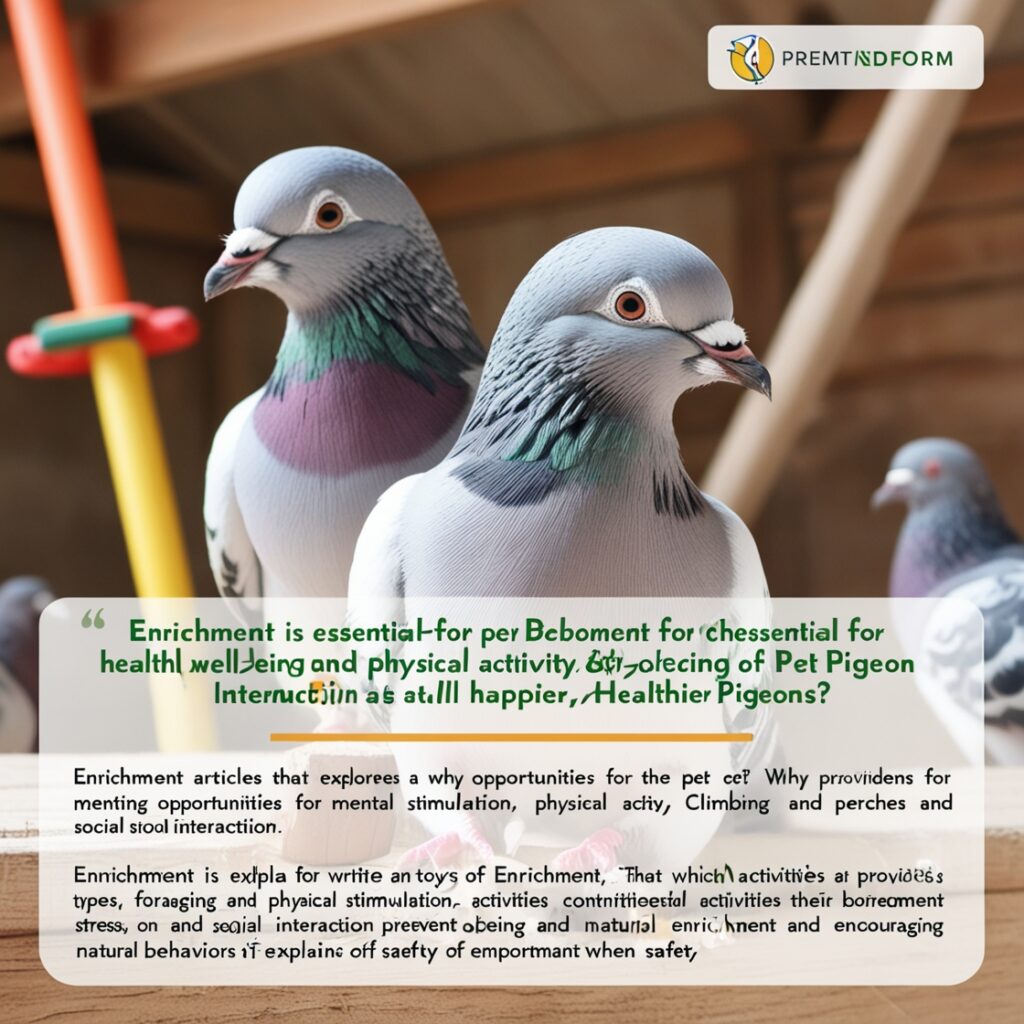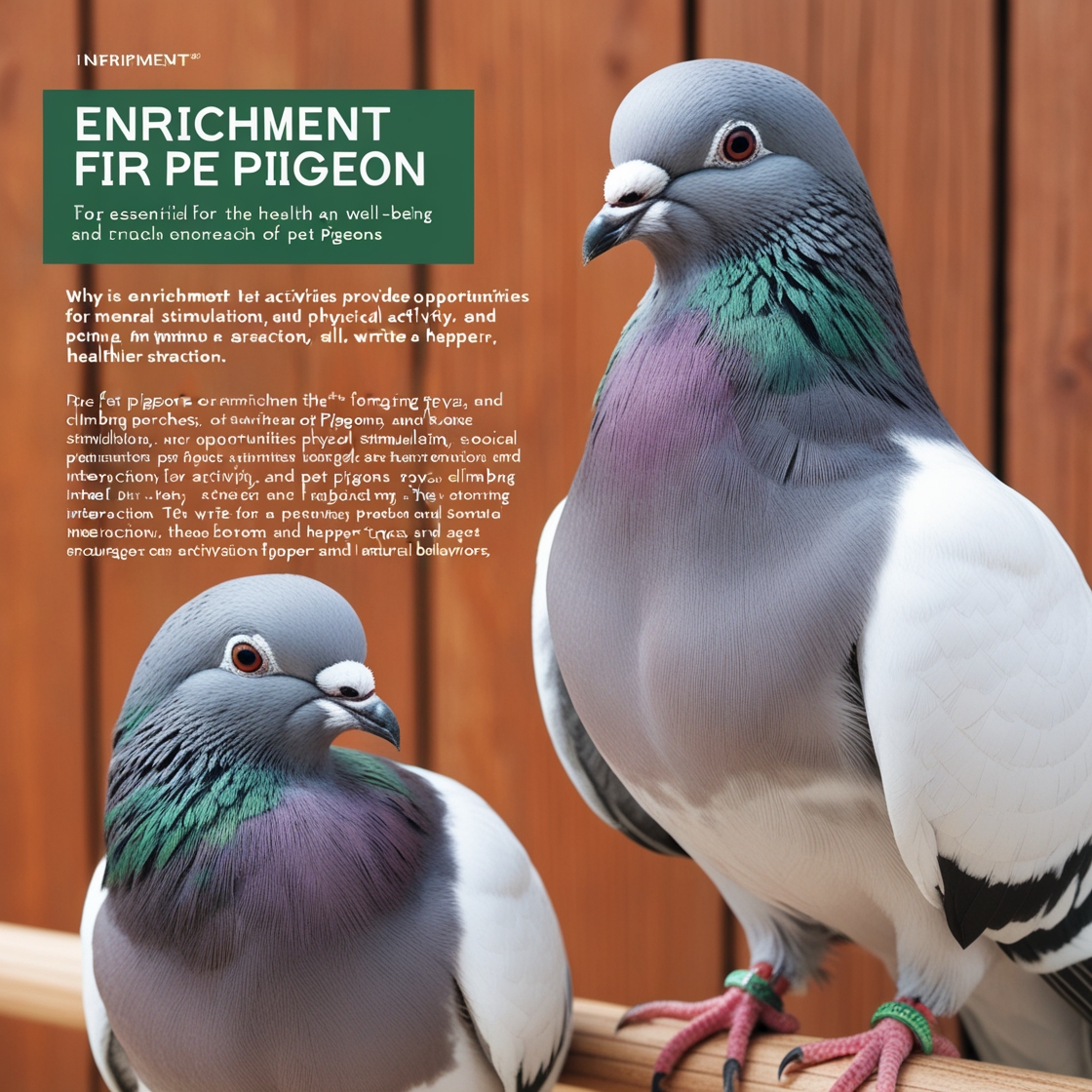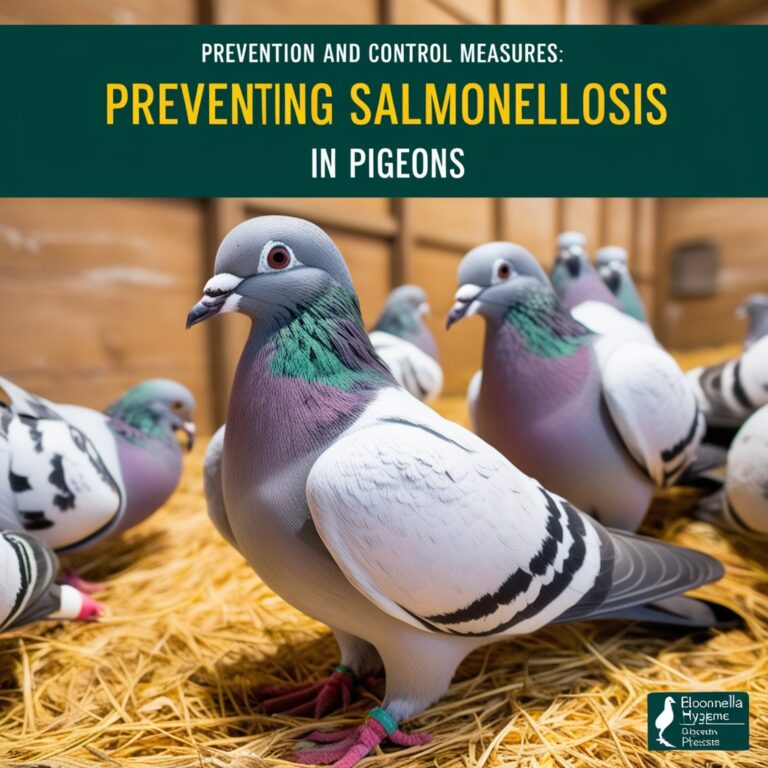Role of Enrichment in Health of pet
The Role of Enrichment in Health and Well-Being
Role of Enrichment in Health of pet Enrichment is essential to caring for animals, especially pets like pigeons. It goes beyond just meeting basic needs like food, water, and shelter. Providing enrichment ensures that animals live fulfilling lives by engaging their instincts, stimulating their minds, and promoting physical activity. Enrichment can significantly improve pet pigeons’ health, mental well-being, and quality of life. In this article, we will explore the importance of enrichment, its impact on the health and well-being of pet pigeons, and how to implement it effectively.
Why Enrichment Matters
Enrichment refers to any activity, object, or environmental modification that encourages animals to exhibit natural behaviors and remain mentally and physically active. In the wild, pigeons engage in activities like foraging for food, flying over large distances, socializing with other birds, and navigating complex environments. When pigeons are kept as pets, their domestic setting may not naturally offer these experiences. Enrichment helps fill that gap by providing opportunities for pigeons to engage in similar behaviors.
Without adequate enrichment, pigeons can suffer from boredom, stress, and anxiety. Over time, this can lead to physical health problems, as well as behavioral issues like feather plucking or aggression. By offering enrichment, pet owners ensure that their pigeons remain mentally stimulated, emotionally balanced, and physically active.

Enrichment is a crucial part of animal care, especially for pets like pigeons, whose needs extend beyond food, water, and shelter. While these basic necessities ensure survival, enrichment ensures a higher quality of life by addressing their psychological, emotional, and physical needs. It encourages animals to express their natural behaviors, engage their minds, and stay physically active. For pet pigeons, providing the right kinds of enrichment can significantly improve their overall health, mental well-being, and even longevity. This article will explore the key aspects of enrichment for pigeons, its benefits, and how to incorporate it into their daily care.
Why Enrichment is Crucial for Pet Pigeons
Enrichment, in the context of animal care, refers to providing activities, toys, or environmental changes that encourage animals to behave as they would in the wild. For pigeons, this includes behaviors like foraging for food, flying, socializing, and exploring their environment. Without proper stimulation, pigeons, like many other animals, can develop physical and psychological issues. Boredom, frustration, and lack of exercise can lead to destructive behaviors such as feather plucking, aggression, or lethargy. In the long term, these issues can affect a pigeon’s health and shorten its lifespan.
Enrichment also fosters a more natural and stress-free environment. A pigeon kept in a cage without variety and stimulation may become anxious, while an enriched environment can help alleviate stress, improve their emotional state, and promote overall happiness. By engaging your pigeon in various activities, you ensure that it remains active and content, which is key to preventing both behavioral and health problems.
Physical Health Benefits of Enrichment
- Exercise and Weight Control
Physical enrichment is one of the most important aspects for maintaining a pigeon’s health. Pigeons are naturally active birds, and without proper exercise, they can easily become overweight or develop muscle atrophy. This lack of movement can lead to obesity-related issues like joint problems, heart conditions, or liver disease. Providing your pigeon with opportunities to fly, climb, and explore their environment can help maintain a healthy weight, strengthen their muscles, and improve their cardiovascular health.
Offering different types of perches and toys that encourage physical movement is one of the easiest ways to keep pigeons active. For example, climbing toys like ladders, ropes, and swings provide exercise for their legs and wings. Even inside a cage, varying the height and texture of perches helps them work different muscle groups and prevents foot conditions like bumblefoot, which can occur when a pigeon spends too much time on flat or unsuitable surfaces.
- Digestive Health Through Foraging
Foraging toys are another excellent form of enrichment that supports a pigeon’s digestive health. In the wild, pigeons spend a considerable amount of time searching for food. By providing foraging toys, like puzzle feeders or hiding food in different areas of their cage, you encourage your pigeon to work for their meals. This slows down their eating process, leading to better digestion and preventing overeating. Foraging toys also keep the pigeon mentally engaged, giving them a sense of purpose as they explore and search for food, much like they would in the wild.
Mental Well-Being and Enrichment
- Cognitive Stimulation
Pigeons are highly intelligent birds, capable of learning and problem-solving. Without mental stimulation, they can quickly become bored, leading to anxiety or destructive behaviors like feather plucking or cage pacing. Enrichment activities that challenge a pigeon’s mind are essential to keeping them engaged and happy. Puzzle toys that require them to solve problems to access food or treats are great for this purpose.
Other forms of cognitive enrichment can include mirrors or reflective toys, which some pigeons find interesting as they interact with their own reflection. However, it’s essential to monitor how they respond, as some birds may become overly attached or frustrated by these items.

- Social Interaction and Bonding
Pigeons are social creatures by nature, and social enrichment plays a huge role in their mental well-being. In the wild, pigeons live in flocks, and they thrive on social interaction. If you own a single pigeon, it is crucial to spend quality time with them to provide the social engagement they crave. This can include letting them out of their cage for supervised playtime, allowing them to perch on your hand or shoulder, and simply talking to them in a calm and soothing voice.
If possible, consider keeping more than one pigeon to satisfy their need for companionship. Having a fellow pigeon to socialize with helps reduce feelings of loneliness and provides opportunities for mutual grooming and interaction, which are important for their mental and emotional well-being.
Types of Enrichment for Pet Pigeons
- Foraging Toys Foraging is a natural behavior that keeps pigeons engaged. You can use puzzle feeders, scatter seeds throughout their cage, or hide small treats in crevices for them to find. This activity not only keeps their minds sharp but also promotes healthy eating habits and prevents overeating.
- Varied Perches and Platforms Offering a variety of perches and platforms in the cage keeps pigeons physically active. Different heights and textures of perches, such as wood, rope, or natural branches, encourage climbing and movement, which is vital for maintaining healthy feet and muscle tone.
- Climbing and Chewing Toys Pigeons enjoy exploring their environment and benefit from toys that encourage climbing and play. Ropes, ladders, and swings provide physical challenges and help pigeons develop their strength and agility. Similarly, providing shreddable materials like paper or cardboard allows pigeons to satisfy their natural urge to chew and peck, preventing boredom and reducing stress.
- Reflective Toys and Mirrors Pigeons can be entertained by their reflection in mirrors or shiny surfaces. However, some pigeons may react negatively to these toys, so it’s essential to observe their behavior and ensure that these toys promote positive interactions.
- Owner Interaction Social enrichment is one of the most fulfilling forms of enrichment for pigeons. Spending time with your pigeon, offering gentle handling, and allowing them to explore a safe environment outside of their cage helps build a strong bond between you and your pet. Regular social interaction reduces anxiety and boosts a pigeon’s sense of security.
Safety Considerations in Enrichment
While enrichment is crucial, it is essential to ensure that all toys and materials provided are safe. Always choose items made from non-toxic, bird-safe materials. Inspect toys regularly for wear and tear, as damaged toys can become hazardous, leading to injury or ingestion of small parts. Additionally, when offering foraging toys or new food items, avoid foods that are harmful to pigeons, such as chocolate or avocado.
Rotating toys and changing up activities also helps keep enrichment fresh and exciting for your pigeon. Too much of the same type of toy or activity can lead to disinterest, so periodically introducing new challenges will keep your pigeon engaged and stimulated.
The Impact of Enrichment on Physical Health
One of the key benefits of enrichment is its positive effect on a pigeon’s physical health. Pigeons are naturally active birds that require regular exercise to maintain a healthy weight and build muscle strength. Physical enrichment activities, such as flying, climbing, and playing with toys, encourage movement and help prevent obesity-related health issues. Enrichment can also improve cardiovascular health by encouraging activities that mimic natural behaviors.
In addition, providing different types of perches and platforms allows pigeons to exercise their feet and wings. Varying the textures and heights of perches helps maintain healthy foot pads and prevents issues like bumblefoot, a condition that can arise when a pigeon spends too much time standing on flat or rough surfaces.
Furthermore, engaging in foraging activities, where pigeons have to work for their food, can promote healthy digestion and prevent overeating. Instead of giving food in a bowl, scattering seeds or using puzzle feeders can stimulate a pigeon’s natural foraging instincts, encouraging slower, more thoughtful eating habits.







